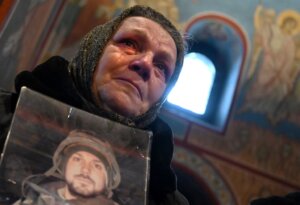The church is a place of comfort and protection, especially when the information field around is saturated with danger. The most recent study shows that over the past decade Ukrainians have begun going to church more and more often.
Around 33.5 percent now go to church at least once a month, compared with only 24 percent in the past.
The annexation of Crimea and the war that Russia launched against Ukraine in 2014 in Donbas may have played a significant role in this regard.
Serhiy Lyubchenko, Bishop of the Church of the Evangelical Faith in Starobilsk, a town of more than 16,000 people near the Donbas war zone, says his flock is now “older”.
After all, most of the young people have left the city in search of a good education and a safer life.
In 2014-15, when hostilities in Donbas were more active, pro-Russian mercenaries threatened church figures with machine guns, demanded support for an artificial referendum on the “self-determination” of quasi-republics and to leave the city as they were treated as “American spies”.
“It was very scary, we didn’t know if we would make it through the day, if we would make it through the night,” Bishop Lyubchenko says.
It was a serious test for the church. Many pastors have left because of threats of physical violence.
Now, eight years later, for Bishop Lyubchenko the war means an acceptance that his name is on the death rolls.
“We have forgotten to be afraid. We have learned to trust God for real. It’s not pathos — it’s a state of our heart, we live for one day. We have only trust. There is no fear or panic. We have increased in prayer, in fasting. We know that the last word is not with politicians, not with presidents, but with God, in whom we trust”, Bishop Lyubchenko sums up.
Central and Western Ukraine do not yet know what direct bombings and blocked roads mean.
But the uncertainty and not knowing what will happen tomorrow, the terrible news and pictures on TV create fear and the need for protection.
“People don’t believe in war yet today. There is fear, but no despair. People can’t yet understand that what we see on television could be in our backyard,” says Orthodox Church of Ukraine Bishop Oleksandr Drabinko.
Bishop Oleksandr Drabinko recalls that people had a similar condition at the beginning of the pandemic, because even then the unknown and new living conditions forced people to think about “divine” protection.

A woman holding a portrait of her dead son cries during a church service commemorating the co-called – Cyborgs – Ukrainian servicemen killed while defending the Donetsk airport in 2015 during the war against Russia-backed separatists in the east of the country, Kiev, January 21, 2020. (Photo by Sergei SUPINSKY / AFP)
The church has been a shelter for the hurting and disadvantaged for many centuries, keeping people’s fervent prayers and hopes for a better future. If religious practices had no effect, they would not have survived to this day, says psychoanalyst Julia Sidak.
“Prayer is a code of faith, of hope that there will be protection and justice. By praying, it is as if one activates that code. It is one thing to sit in fear, terror. Then a person turns into an object that can be controlled. But a person who appeals in prayer to something higher, he is already a subject in relation to his threat. This means that he is looking for a way out,” Sidak says.
Andrii Musienko from Lubny, a well-known town in central Ukraine with less than 50,000 population, is 34. He is a single young man for whom family is a priority value.
After seeing my question on social media whether my followers are turning more to God and church, he confidently answers that he prays every day to stop Russian aggression.
“We have hope, I believe in the victory of Ukraine. I usually pray over icons at home. Sometimes I may go to church. If, after all, Putin wishes to attack, then let him do so by thinking about his relatives, about the soldiers and their parents, let him think about the children, whose lives he will turn into a hell. Ukrainians will unite against the enemy, we are supported by other countries and believe in victory,” Andrii writes.
This appeal of mine has received many more reactions than others.
Ukrainians from different regions are responding, thinking hard about how God can help the in the current situation, a critical infomercial that is hurting the nation’s mental health.
Julia Sidak believes that faith activates the desire for something bigger, more powerful at a time of excessive anxiety.
This is what unites war and church.
And in the current geopolitical climate, people will also look to the church for protection, Sidak believes that “There are no atheists on a falling plane. We are in a position of permanent uncertainty, and for us it does matter whether our plane lands or not.”
